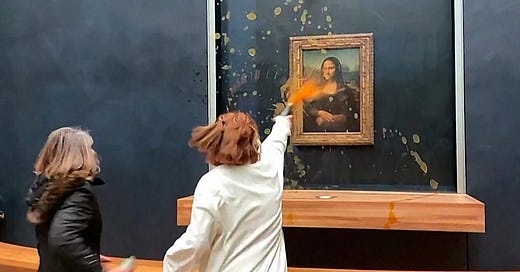What makes something beloved? Memorable? Inneresting?1 And what does it mean when something is regularly held up as valuable?
Take the Mona Lisa.
Alicja Zelazko charts out how it’s not any one thing that makes the Mona Lisa famous, but an extended series of events over a period of centuries that gave it its cultural cache. Anne Cohen talks with Rian Johnson about the reasons why the painting plays such a crucial part of Glass Onion:
“It’s a sacred cow, but it’s almost more famous for being famous. It’s so ridiculous that the audience will make the leap and get the joke. [….] There’s something about the Mona Lisa that’s in the popular consciousness where it still has all the weight of being, ‘Holy shit, it’s the Mona Lisa!’ ”
But it doesn’t always take centuries for something to earn status as a cultural icon. BBC Culture probes into what makes Citizen Kane an evergreen story about money, power, and the thirstiness of the rich and powerful to feel loved (on their own terms). Ashley Fetters talks with Alan Light about his book detailing how the many covers of Leonard Cohen’s “Hallelujah” built up its profile and kept it alive.
Understanding what rises above the rest and stays relevant isn’t just a cultural criticism question, but one with plenty of money to be made. Jason Kottke does a round up about the Napoleon Dynamite problem, and how Netflix offered a prize to improve its algorithm’s ability to predict other movies people will want to watch. Jack Nugent digs deep into this problem, and how we can look at Napoleon Dynamite to understand what makes it so difficult to find a blanket answer for why people enjoy the film:
👋 Are you new here?
Inneresting is a weekly newsletter about writing and things that are interesting to writers. Subscribe now to get more Inneresting things sent to your inbox.
Previously on Inneresting…
In case you missed it, last issue’s most clicked link Nat Bennett explains a strategy for joining a new team or starting a new job called the “WTF Notebook.”
What else is inneresting?
Kate Bove explores how Bandit Heeler’s love language is annoying others (for mostly the right reasons).
Mike Grindle wants you to blog again, saying that writing for SEO is out and storytelling is back.
Jillian Hess considers how Franz Kafka’s diaries helped him see that he could survive difficult things.
And that’s what’s inneresting this week!
Inneresting is edited by Chris Csont, with contributions from readers like you and the entire Quote-Unquote team.
Are you enjoying this newsletter?
📧 Forward it to a friend and suggest they check it out.
🔗 Share a link to this post on social media.
🗣 Have ideas for future topics (or just want to say hello)? Reach out to Chris via email at inneresting@johnaugust.com, Mastodon @ccsont@mastodon.art, or Bluesky @ccsont.bsky.social
Post-Credits Scene
“The only way to get rid of a temptation is to yield to it. Resist it, and your soul grows sick with longing for the things it has forbidden to itself, with desire for what its monstrous laws have made monstrous and unlawful.” —Oscar Wilde, The Picture of Dorian Gray






